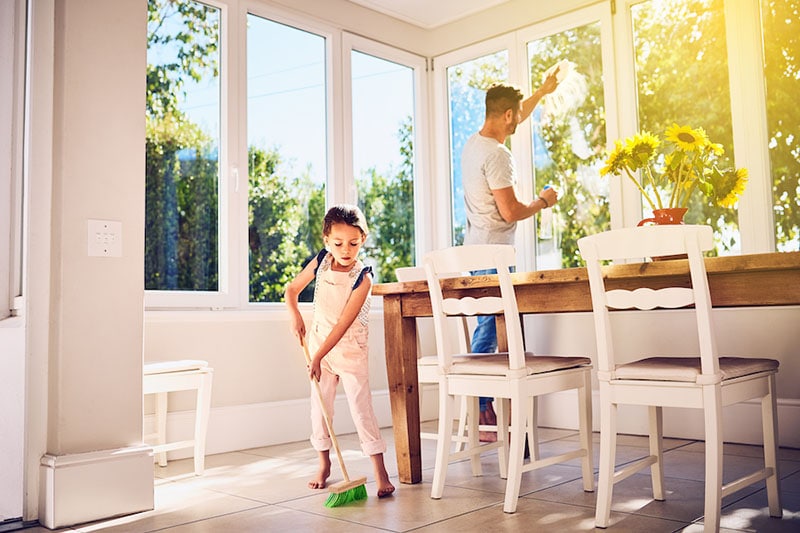The number of people suffering from respiratory conditions in the US is high. According to the American Lung Organization, approximately 37 million Americans live with chronic lung diseases such as asthma and chronic obstructive pulmonary disease (COPD). One of the causes of these deadly diseases is poor air quality. Indoor air contaminants can cause or intensify some of these diseases. Therefore, it’s crucial for your well-being that you take in clean and safe air. With that in mind, here are seven tips on how to maintain good air quality at home during summer:
Repair your air conditioner
Air conditioners (AC) have air-purifying filtration features that filter and circulate air, removing pollen, dust, pet fur, and bacteria, thus improving air quality. You may have to replace your filters after approximately three months.
However, during summer, the filters trap more particles; hence you may need to replace them more often. For best results, enlist the help of an expert. Search for AC repair near me to identify a reliable company you can work with.
When replacing an AC, there are a few factors to consider since there isn’t a one-fits-all method. Experts are well-versed in numerous types of air conditioning and how they work. Therefore, it’s best to seek professional services. They’ll ensure your AC is fixed quickly and appropriately. However, as you search for AC repair near me Atascocita, TX, ensure you choose a reliable company.
If you need emergency AC repair services during summer, don’t risk it by doing the repair yourself. Contact professionals immediately. Otherwise, it will be harder for you to maintain good air quality in your home. Check out this video to know more https://www.youtube.com/watch?v=GYej2AJu5Kk.
Optimize ventilation
Another great way to maintain good air quality at home during summer is by improving ventilation. When air stagnates in your room for a long time, there are high chances of developing health issues or worsening conditions like allergies and asthma. With proper ventilation, you can minimize the concentration of indoor air pollutants and increase the amount of fresh air coming into your home.
Mostly, home cooling systems don’t bring in the fresh air. Open windows and doors are the best way to displace stale air and ensure a constant fresh air flow in your home. However, this may come in with dust particles. Therefore, ensure you regularly dust your home, change filters, and clean air ducts since dust can accumulate over time.
Minimize airborne pollutants
Most home air pollutants originate from daily chores. For instance, most cleaners and fragrances are treated with chemicals. These substances release gasses that can be harmful. Also, some decor items like carpets contain volatile organic compounds (VOCs) and unleash chemicals that can become airborne with time. For this reason, lower the use of cleaning products containing harmful chemicals.
To significantly reduce indoor air pollutants, ban smoking inside your home. Cigarettes contain various airborne chemicals, and most of them are air contaminants. Also, consider the material and fillers when buying new furniture, carpet, or paint and go for more natural products.

Invest in indoor plants
Potted plants are more than decorations in your home. They minimize indoor pollutants and improve air quality by converting toxins into clean oxygen. Ideally, they absorb carbon dioxide and release oxygen. Not all indoor plants purify the air, but some of the top ones for your consideration include the following:
- Dracaena
- Peace Lily
- Rubber plant
- Snake plant
- Aloe Vera
- English Ivy
- Areca Palm
You can buy more than one plant as each absorbs different pollutants in your home and helps you boost your well-being.
Clean your home regularly
Each time a family member goes in and out of the house, they may carry dust, allergens, pollen, and other contaminants with them. Cleaning your home frequently prevents these pollutants from contaminating your home’s air quality.
Therefore, frequently clean your sheets and floor, and dust your furniture. This removes any build-up and prevents dust particles from spreading throughout the house. Additionally, place a mat outside your door and have your family members leave their shoes at the door to prevent allergens from getting inside your home.
Regulate your home’s humidity
The ideal indoor humidity for good health and comfort is between 40 to 60%. During summer, humidity levels are higher since warm air stores higher moisture. Excess moisture in your home promotes the growth of harmful bacteria, molds, viruses, etc. These pollutants can cause respiratory infections, trigger allergy and asthma symptoms, or lead to other health issues.
To reduce the amount of moisture in your home during summer, install a dehumidifier. Also, take shorter and colder showers, and reduce laundry and cooking sessions since all these contribute to increased humidity levels at home.
Utilize cooking vents
Some home air contaminants originate from the kitchen. Gas stoves unleash harmful pollutants such as nitrogen dioxide and carbon monoxide. Also, electric burners release similar contaminants but at lower levels. Therefore, when cooking, ensure you switch on your kitchen vents. This removes smoke heat fumes, airborne grease, and steam by evacuating and filtering the air.
Conclusion
When spending time at home with your family during summer, it’s essential to ensure you breathe clean and safe air. This keeps you and your family members safe from typical respiratory conditions. Low air quality makes breathing more difficult and unpleasant, especially for family members who have allergies. Therefore, ensure you maximize ventilation, schedule regular cleaning, and reduce the use of chemicals at home to improve indoor air quality.